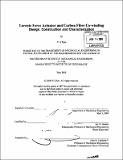Lorentz force actuator and carbon fiber co-winding design, construction and characterization
Author(s)
Chen, Yi, S. B. Massachusetts Institute of Technology
DownloadFull printable version (36.00Mb)
Other Contributors
Massachusetts Institute of Technology. Dept. of Mechanical Engineering.
Advisor
Ian W. Hunter.
Terms of use
Metadata
Show full item recordAbstract
Carbon fiber composites are materials that present many benefits to engineering applications, ranging from aerospace to medicine. This thesis provides background on carbon fiber properties and manufacturing techniques, and outlines the methodology for manufacturing a co-wound carbon fiber and copper coil for use in linear Lorentz force actuators. A conventionally-wound, plastic-bobbin actuator coil and the new, co-wound coil were then tested to compare their electrical, thermal, and mechanical performance. In a needle-free injection application, the cowound coil demonstrated improved performance over the conventional coil configuration. The carbon fiber coil is lighter by 3.75 ± 0.155 grams, increases the transient heat transfer by 15.7 %, is 2.18 ± 0.13 times stiffer, and can survive a higher compressive force than the conventional plastic bobbin.
Description
Thesis (S.B.)--Massachusetts Institute of Technology, Dept. of Mechanical Engineering, 2008. Includes bibliographical references (p. 66-67).
Date issued
2008Department
Massachusetts Institute of Technology. Department of Mechanical EngineeringPublisher
Massachusetts Institute of Technology
Keywords
Mechanical Engineering.